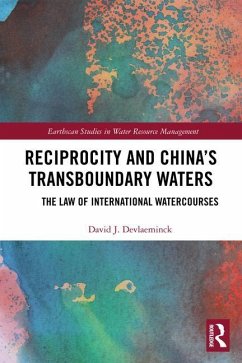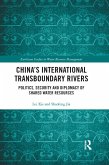Utilizing the principle of reciprocity, Reciprocity and China's Transboundary Waters: The Law of International Watercourses analyses the past, present and future of the law of international watercourses with a particular focus on China.
As a legal principle, reciprocity plays a strong role in the formation, interpretation and maintenance of international law. Implementing this framework, the book examines the development of the law of international watercourses, highlighting how this basic legal principle is a foundational notion. It applies the framework to China and offers insights into one of the most important transboundary states in Asia. As a primarily upstream state, China is of great significance to its transboundary neighbours; however, there remain significant hurdles, misunderstandings and mistrust between China and its neighbours. China is faced with a complex challenge - how to meet its own development needs while also taking into consideration its primarily downstream neighbours? By focusing on this prominent state this work not only fosters a greater understanding of the law of international watercourses within China, but also clarifies and challenges current perceptions of China's transboundary water treaty practice. More generally, the book provides a past, present and future view on international watercourse law, starting with an analysis of the UN Watercourses Convention and UNECE Water Convention leading to a discussion of reciprocity's continued influence as well as charting a path forward.
This book will be of great interest to legal students and scholars with an interest in international watercourses, environmental politics and international law, as well as students and scholars interested in Chinese politics and natural resource management and conflict.
As a legal principle, reciprocity plays a strong role in the formation, interpretation and maintenance of international law. Implementing this framework, the book examines the development of the law of international watercourses, highlighting how this basic legal principle is a foundational notion. It applies the framework to China and offers insights into one of the most important transboundary states in Asia. As a primarily upstream state, China is of great significance to its transboundary neighbours; however, there remain significant hurdles, misunderstandings and mistrust between China and its neighbours. China is faced with a complex challenge - how to meet its own development needs while also taking into consideration its primarily downstream neighbours? By focusing on this prominent state this work not only fosters a greater understanding of the law of international watercourses within China, but also clarifies and challenges current perceptions of China's transboundary water treaty practice. More generally, the book provides a past, present and future view on international watercourse law, starting with an analysis of the UN Watercourses Convention and UNECE Water Convention leading to a discussion of reciprocity's continued influence as well as charting a path forward.
This book will be of great interest to legal students and scholars with an interest in international watercourses, environmental politics and international law, as well as students and scholars interested in Chinese politics and natural resource management and conflict.
"By focusing on the impact of the fundamental principle of 'reciprocity' in the practice of international water law, this ground-breaking book explores the realpolitik of water diplomacy, highlighting the self-interest of States in engaging in transboundary water cooperation. It provides a novel, yet highly valuable framework within which to analyse and understand the approach of China, as probably the single most important State actor in the practice of transboundary water law today." - Owen McIntyre, School of Law, University College Cork, National University of Ireland, Ireland
"Reciprocity, China, transboundary waters -- three hot topics, examined here in an innovative legal study, offering fresh insights into the complex issues integral to transboundary water cooperation. Reciprocity -- over-looked, under-studied - is integral to understanding not only China's transboundary water practice, but also right across the field." - Patricia Wouters, Director, International Water Law Academy, Wuhan University, China
"Reciprocity, China, transboundary waters -- three hot topics, examined here in an innovative legal study, offering fresh insights into the complex issues integral to transboundary water cooperation. Reciprocity -- over-looked, under-studied - is integral to understanding not only China's transboundary water practice, but also right across the field." - Patricia Wouters, Director, International Water Law Academy, Wuhan University, China








